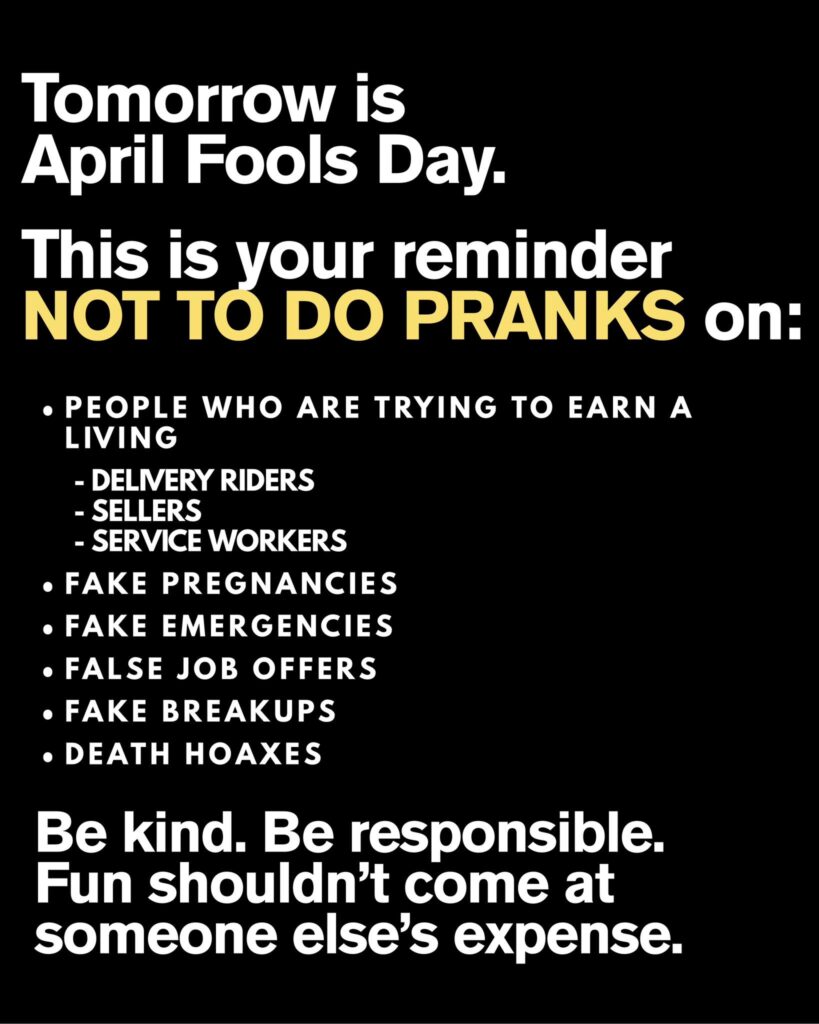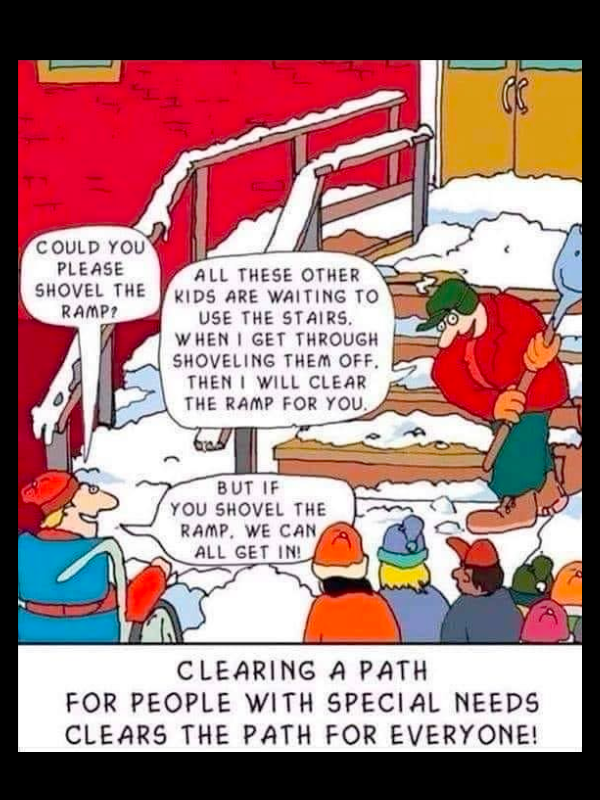
Have a good April Fools’ Day tomorrow, but be mindful about your pranking.

Have a good April Fools’ Day tomorrow, but be mindful about your pranking.
The saying is doubly true for anyone who works under Florida Governor Ron DeSantis: “No good deed goes unpunished,” and wow, did James Gaddis get punished for his good deed.
Gaddis, pictured above, was the employee at the Florida Department of Environmental Protection who leaked the state’s rushed-under-cover-of-secrecy plans to build golf courses, hotels, pickleball courts, and more land developer-friendly conversions of Florida’s state parks, which are natural protected lands. His leaking of that information and the Florida government’s rushed timeline led to the outcry that led to the postponement of those plans.
Here’s what Gaddis told the Tampa Bay Times:
“It was the absolute flagrant disregard for the critical, globally imperiled habitat in these parks,” Gaddis said in an interview Monday morning. Gaddis said he was tasked with making the proposed conceptual land use maps that depicted the golf courses and other developments. Two proposals were especially egregious in his eyes: The Jonathan Dickinson State Park golf course, and the 350-room hotel at Anastasia State Park.
“This was going to be a complete bulldozing of all of that habitat,” Gaddis said. He recalls his hand, hovering over a computer mouse, shaking with anger and frustration as he was told to rush his maps from senior leadership. “The secrecy was totally confusing and very frustrating. No state agency should be behaving like this.”
Unfortunately, doing the right thing sometimes means doing the career-limiting thing. For his heroic actions, he was fired. Here’s his dismissal notice:
While he was technically fired for “conduct unbecoming a public employee,” it’s the rest of Florida’s Department of Environmental Protection who are truly guilty of unbecoming conduct, for doing the exact opposite of what the Department is supposed to do.
Because the job market is tough out there, Gaddis has set up a GoFundMe to help him as he looks for new work. Because what he did was heroic, he’s surpassed the modest goal of $10,000, but don’t let that stop you from pitching in.
Thank you, James Gaddis, for taking the whistleblower risk and saving our state parks!
With much secrecy, little notice, and almost no time slated for public feedback, Florida’s governor, Ron DeSantis announced a plan to put golf courses and pickleball courts in Florida’s state parks.
The state’s original plan was to hold public meetings on one day only — tomorrow, Tuesday, August 27th — where members of the public would have three minutes each to voice their opinions.
From the Tampa Bay Times:
Eric Draper, who served as the director of Florida’s state parks between 2017 and 2021, said it appears the state’s environmental agency is skirting the legal process and the parks system’s own internal operations manual for updating park management plans.
“This appears to be something that has been planned in secret, and it doesn’t appear to have involved the hundreds, if not thousands, of people who are volunteers in the parks, the citizen support organizations, or the many people who have been involved in helping to create and develop Florida’s award-winning park system,” Draper said in an interview with the Tampa Bay Times.
Before the environmental agency formally introduced its proposed changes, staff should have convened a citizens advisory committee made up of other state agencies and people who are working at state parks, Draper said. That advisory committee should have then met and held a public hearing.
The affected state parks would be:
| The park | The plan |
| Jonathan Dickinson State Park | Public golf courses and other facilities, including the removal of the Hobe Mountain Observation Tower, an existing park entrance, staff residences and more. |
| Anastasia State Park | A park lodge with 350-room capacity, up to four pickleball courts, a disc golf course. |
| Topsail Hill Preserve State Park | A park lodge with 350-room capacity, up to four pickleball courts, a disc golf course. |
| Grayton Beach State Park | Up to 10 cabins, a beach access restroom, up to four pickleball courts, a disc golf course. |
| Hillsborough River State Park | Up to four pickleball courts, a disc golf course. |
| Honeymoon Island State Park | Up to four pickleball courts. |
| Oleta River State Park | Up to 10 cabins or glamping space, up to four pickleball courts, a disc golf course. |
| Dr. Von D. Mizell-Eula Johnson State Park | Up to four pickleball courts. |
| Camp Helen State Park | Up to 10 cabins or a glamping area. |
Find out more here:
Join or Die is a film about why you should join a club — and why the fate of America may depend on it. And I want to get it screened in Tampa — at the Tampa Theatre.
Here’s the trailer for the film:
Join or Die is a feature documentary about community in America, as viewed through the lens of political scientist Robert Putnam’s research and the ideas from his 2000 book, Bowling Alone. The thesis of Bowling Alone is that:
The title Bowling Alone comes from a friend of Putnam’s who owned a bowling alley. The friend remarked that while bowling was up, bowling leagues and bowling as a group activity had gone down.
The decline of bowling as a group activity mirrored other declines. As Putnam says in interviews featured in the film:
How many times last year did you go to church? Down. How many times did you go to a dinner party? Down. How many times last year did you go to a club meeting?
In barely a couple of decades, half of all the civic infrastructure in America had simply vanished. It’s equivalent to saying half of all the roads in America just disappeared!
Robert Putnam, from the trailer for Join or Die
Here are some “bowling alone” stats, taken from the site for Join or Die:
Putnam’s research is all about what makes a society succeed or fail, and he puts forth the idea that it’s about the connections and trust that people make, and the sense of “duty of care” that arise from them. If you get together, get to know your neighbors, build trust not just within a group (“bonding”) but between groups (“bridging”), there better things are — and not just for individuals within the society, but the entire society itself.
Putnam’s been studying this topic for a long time. His 1993 book, Making Democracy Work, was based on his study of regional governments in Italy, which were similar structurally, but different operationally — a difference that went back a whole millennium:
(By the bye, the next time some crank tries to tell you that America isn’t supposed to be a democracy, remember that they’re envisioning a southern Italy-like scheme and that they won’t be the peasants in that setup.)
Wikipedia sums up Putnam’s thesis nicely:
Putnam believes that for democracy to be successful there needs to be a level of mutual trust among the citizens and a more horizontal system of governing, all of which Northern and Central Italy has enjoyed. Putnam states in Making Democracy Work that civil society creates wealth, wealth does not create a civil society. The civic nature of Northern Italy and Central Italy dating back to medieval times has caused the region to be prosperous in modern times. Southern Italy, however, with its more feudal nature in medieval times has caused the region to be the origin of the Mafia and has created a less successful region. The Mafia’s hierarchical structure is very similar to Southern Italy’s feudal roots, according to Putnam.
https://en.wikipedia.org/wiki/Making_Democracy_Work#Author_thesis
I want to see this film — don’t you?
Here’s the challenge: it’s not available on streaming platforms and it’s not being distributed in the way more mainstream films are. If you want to see it, you have to contact the filmmakers and ask them to host a screening in your community.
So I did just that. I even suggested that Tampa Theatre would be a great venue for it.
Getting a screening here in Tampa will take more than just my effort, and it may take some money. I’m going to need help with this one, and if you’re interested in helping, drop me a line!
From the International Women’s Day site:
Imagine a gender equal world. A world free of bias, stereotypes, and discrimination. A world that’s diverse, equitable, and inclusive. A world where difference is valued and celebrated. Together we can forge women’s equality. Collectively we can all #InspireInclusion.
Celebrate women’s achievement. Raise awareness about discrimination. Take action to drive gender parity.
IWD belongs to everyone, everywhere. Inclusion means all IWD action is valid.

It’s all too easy for we (temporarily) ambulatory people to treat special needs as a secondary concern, but as the comic above points out, accommodating people with special needs accommodates everyone.
(This doesn’t just apply to buildings — if you design or develop software or web pages, keep this in mind!)